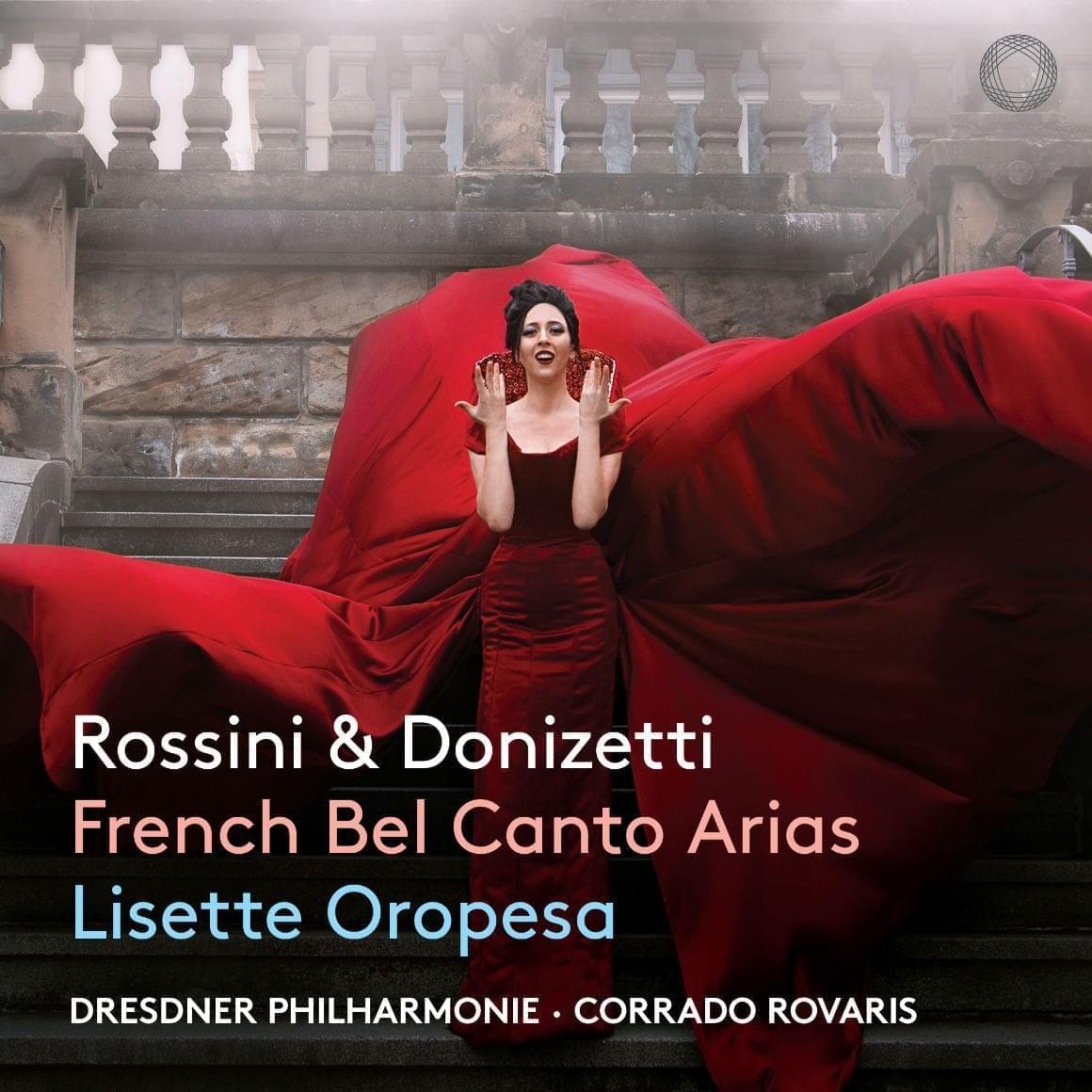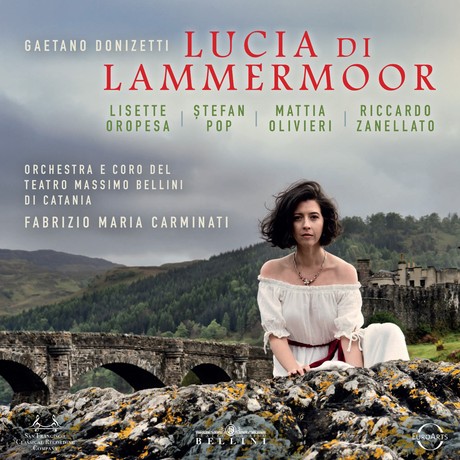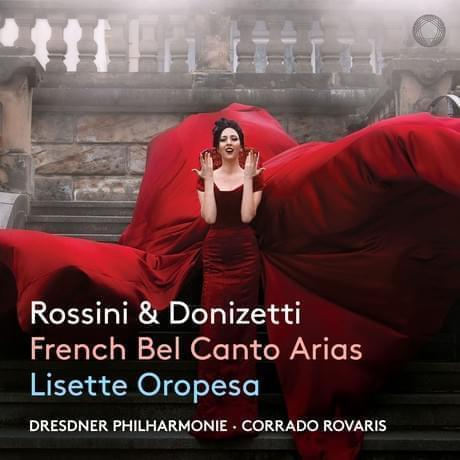I can't thank everyone enough for the kind and incredible reviews of our new album with the Dresdner Philharmonie and Corrado Rovaris conducting. This album was a culmination of many years of planning and I am so happy that we were able to put something together that is really special. I am overwhelmed with the responses to the album! Read some of the reviews below:
Grammophone - One of the Best Classical Albums of the year.
Native DSD - One of the best Classical Vocal Albums of the year.
New York Times - One of the best Classical Tracks of the year (Céleste providence).
Culture Week - One of the Best Albums of 2022
Scherzo Magazine - Discos Excepcionales April 2023
Oropesa's thoughtful choice of repertory is balanced by performances of comparable insight and brilliance. She's in wonderful voice throughout, her coloratura at once dazzling and expressive, her sense of line often flawless, text, character and emotions exactingly conveyed. ~ Gramophone
Oropesa is in glorious voice through-out, sometimes in fiendishly difficult music. The disc begins with four tracks from Le Siège de Corinthe, Rossini's reworking of his earlier Maometto II. Oropesa sings with exquisite beauty, dispatching the challenging arpeggios and scales of the pieces with ease. The coloratura runs are magnificent, and she has that rare gift of expressing meaning with them, not allowing them to become mere displays of technique. ~ Opera News
Con il suo timbro chiaro e luminoso e dal vibrato distintivo ma ben controllato, canta con gusto, colore e musicalità spiccata. La linea di canto è curatissima nel legato e la coloratura fluida, precisa e non aspirata, i trilli stretti fino quasi a diventare un tutt’uno con il vibrato. Oropesa controlla bene il suo strumento e canta senza sforzi. Il registro centrale ha poi acquisito tinte scure che le consentono di padroneggiare una buona estensione e una buona palette di colori. ~ Connessi all'Opera
Auf ihrer neuen Arien-CD „French bel canto Arias“ hat sich Lisette Oropesa Opern in französischer Sprache der Komponisten Gioacchino Rossini und Gaetano Donizetti vorgenommen. Eine blendende Idee, denn die Arien der Pamyra aus „Le siège de Corinthe“, der Mathilde aus „Guillaume Tell“ (die sie auch auf der Bühne zu singen plant) oder der Comtesse aus „Le Comte Ory“ sind nicht nur Raritäten, sondern passen ideal zu Stimmtyp und Reifegrad der Sängerin, die auf dem Zenit ihrer Möglichkeiten angekommen zu sein scheint. ~ Online Merker
It’s a brave program (and artist) that segues from Guillaume Tell into Le Comte Ory, sells featherweight La fille du Régiment alongside Le Siège de Corinthe. But such is Oropesa’s skill, and so idiomatic are the Dredner Philharmonie and the Sachsischer Staatsopernchor Dresdeden under Corrado Rovaris, that it feels totally, thrillingly convincing. ~Limelight Magazine
Lisette Oropesa verfügt über ein leicht zu identifizierendes, persönliches Timbre, das diesen Koloraturarien sehr zugute kommt. Die Stimme ist in allen Registern sicher geführt und hat Fülle und Wärme. Die zahlreichen Spitzentöne erreicht die Sängerin souverän und unangestrengt. ~ Klassik begeistert
Elogiare la vocalità di Lisette Oropesa, la sua organizzazione tecnica, la pulizia della linea di canto, i lunghi legati, il nitore delle colorature, la tornitura e la precisione dei trilli e tante altre amenità vocali ci condurrebbe a stilare un elenco di caratteristiche già note e comunque immediatamente percepibili ad un ascolto attento. Invece, nel recensire questo CD, preferiamo soffermarci sull’intelligenza dell’artista, sulla calibrata raffinatezza e aderenza stilistica delle sue interpretazioni, sullo scavo negli accenti delle parti e sulla spasmodica ricerca dei più appropriati colori per ciascuna dei sei personaggi interpretati in questo recital. ~ L'ape musicale
la cantante ofrece dos escenas espectacularmente floridas de Pamyra de Le siège de Corinthe marcando la pauta del contenido del CD: a un timbre de voz que es todo crema batida y merengue une un delicioso gusto por el ornamento, unas variaciones precisas y expresivas, escalas, agudos y el obligatorio canto legato, sin olvidarse nunca de llevar todo tipo de agilidades al terreno teatral para dar sentido dramático a su fraseo. Lo hace sin esfuerzo aparente sobre una técnica que le permite una emisión tan natural como brillante tanto en las escenas virtuosas –muchas emitidas a velocidad de vértigo– como en las contemplativas, en las que la línea de canto alcanza cotas mágicas, como en “Juste ciel”. ~ Opera Actual
Der lyrische Koloratursopran ist in allen Lagen von gleicher Farbe, die Phrasierung ist generös, das Piano farbig. Als Mathilde aus Guillaume Tell offenbart sie die empfindsame Seele der Figur bereits im Rezitativ, ehe in der Arie ein schöner Schwellton und die reiche Agogik erfreuen, die Kadenz fein ausgekostet wird. Schillernd und funkelnd mit einem ironischen Touch und sprühend vor Lebensfreude äußert sich die Adèle in Le Comte Ory, der Spitzenton in der Arie wird mühelos erreicht. ~ Opera Lounge
Lisette Oropesa, for all her wonderful coloratura ability and upward extension, is nothing like a soubrette. Her very first notes here, from Le Siège de Corinthe, are warm and pleading, the tone round and full–and utterly beautiful. As the voice rises, it doesn’t lose texture. The coloratura is close to flawless, as is her pitch. ~ Classics Today
We find with pleasure the flawless musicality of the singer, a neat but never purely hedonistic vocal line, a discreet emotion constantly surfacing at the bend of the notes... but also of the words, because the diction is excellent, the pyrotechnics never leading Lisette Oropesa to sacrifice the clarity of the text. ~ Premiere Loge Opera
Paradoxically, her crystalline and clear timbre would be out of place a bit with the context and with the genre, but as soon as the lyrical passages allow it, it is there that Oropesa gives her best. The softness and admirable legato with which we immerse ourselves in the intimate and dreamy atmosphere of « Sombre forêt » from Guillaume Tell are commendable ~ MusicPaper.it
The thrill of the voice singing in French - Self-portrait of an artist. Singing and digging into the emotions that the French language (and rewriting) unearth in an anthology that runs from Comte Ory and Tell to Lucie de Lammermoor. On the edge of pure virtuosity but eager to identify with the characters, the execution pushes towards a romantic theater of voice and style of rare strength and truth. ~ Angelo Foletto - La repubblica
Lisette Oropesa confirms in this recital all the compliments that the critics have already addressed to her. She did not choose the easy way: thirty-five minutes of Rossini and half an hour of Donizetti, in tunes chosen from the pages that the two composers wrote for Paris, with a structure that makes luminous tunes or brilliant with others, more internalized. ~ Crescendo Magazine
La intérprete cumple con las condiciones instrumentales de cada página y, lo que es más destacable, sabe darles el apropiado contenido, pasando, en extremos rossinianos, de la atormentada corintiana que es Pamyra a la sutil y deliciosa picardía de una Adèle del Ory que se ciñe muy bien a sus aptitudes (lo cual demuestra con un inesperado sobreagudo). ~ Scherzo Magazine



,format(webp)/https%3A%2F%2Flisetteoropesa.com%2Fmedia%2Fgallery%2F2017%2Fpublicity%2Fcrystal-green%2Flisette-oropesa-crystal-green-01.jpg)
,s,m,a,r,t,,,f,o,r,m,a,t,(,w,e,b,p,),,,s,h,a,r,p,e,n,(,0,.,5,,,0,.,5,,,t,r,u,e,)/https%3A%2F%2Flisetteoropesa.com%2Fmedia%2Fgallery%2F2024%2Fportraits%2F202408-03-portrait-lisette-oropesa.jpg)







